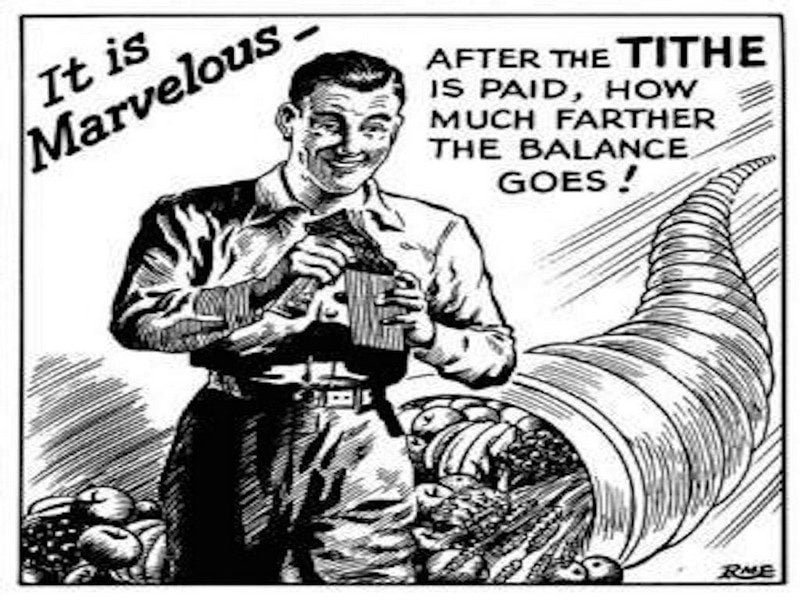
Evangelical preachers are known for their legendary sermons on tithing, giving offerings to the building fund, missionary fund, and funding the whims (needs) of the church and pastor. Congregants are expected to give ten percent of their gross income to the church, and if they are really, really, really right with God they will financially support the missionaries, building programs, and give whenever a special offering is called for; say to pay an evangelist, buy a van for the church, purchase a copy machine, or send the pastor and his family to a retreat. The opportunities to give to God are endless.
Who hasn’t heard a sermon on Malachi 3:10:
Bring ye all the tithes into the storehouse, that there may be meat in mine house, and prove me now herewith, saith the Lord of hosts, if I will not open you the windows of heaven, and pour you out a blessing, that there shall not be room enough to receive it.
“Just remember,” IFB preachers say, “you can’t outgive God.” Surely, church members want God to open up the windows of Heaven and pour them out a blessing, so they give money they do not have to the church, believing God will come through for them. And when he doesn’t? Members are encouraged to faith-it; to keep giving, no matter what. God will eventually come through, and if he doesn’t in this life, he will reward you in Heaven. Where have we heard that canard before? Are your prayers for healing or material needs going unanswered? Just remember, God will give you after death a perfect body and a glorious, luxurious home in Heaven. All the promises of God are offloaded to the afterlife. Believers are expected to endure hardness as good soldiers, knowing that in Heaven God will settle all his IOUs.
Polly and I gave lavishly to the church, even if that meant doing without. Doing without was just God saying to us we didn’t need it. Besides, I wasn’t really giving to the church, I was giving to God. The church was just the bank. For a time, I became a fundraiser for God. What God wanted, I shook down congregants for the funds to pay for it. In retrospect, I now see that what God wanted and what Bruce wanted were one and the same. What church members were funding was my wants and ambitions. Sure, we had to pay for the clubhouse, keep the utilities on, and pay for our programs and ancillary expenses, but I still find it difficult to separate Bruce from God. How could I, or anyone else for that matter, know what God wanted? He doesn’t seem to be the talkative type.
A big problem for me is that I was a full-time pastor. For twenty-five years, I treated the church as a full-time job; my primary employment. None of the churches paid me a full-time wage, with benefits, but they got 40-60 hours a week from me nonetheless. Of course, I had a family to feed and bills to pay, so I often worked secular jobs or, in later years, Polly worked jobs outside of our home. We treated our outside employment as a means to an end: funding our work in the ministry.

Somewhere in the late 1990s, I stopped being a fundraiser for God. Most of the families in the church I was pastoring at the time were working poor; people who struggled to lived from day to day. I felt guilty badgering them to give money that they didn’t have. Instead, I took a “give what you can” approach. I stopped passing the offering plate, putting a box at the back of the church for people to use for their offerings.
I also stopped tithing on my church income. It made no sense to me to give money to the church, only to receive it back as salary. I was, in effect, funding my own salary. Oh, we still liberally supported the church and personally helped congregants with their material needs.
While I never treated the church as an ATM machine, I knew more than a few Evangelical preachers who did. In their minds, what they — I mean God — ordered, the church — I mean God — paid for. Remember, with God ALL things are possible, including buying the preacher a new automobile.
If I were asked to give young Evangelical preachers advice about money and the ministry, I would tell them to treat their churches as a part-time job; that their ministries and communities would be better served if they worked full-time secular employment, instead of walling themselves off in the safe confines of their churches and your studies. Years ago, I heard a missionary explain why he sponsored a dirt track race car. He believed it was important to be in the world, to get dirty for God. Yes, we are Christians, but we are everyday humans too, just like the unwashed, uncircumcised Philistines of the world.

The question these fundraisers for Jesus need to ask themselves is this: why is God so poor? If he is a miracle-working deity, why can’t he provide a bag of money each Sunday for churches just like he did when he provided manna for Moses and the wandering Jews? Why does God need church members to be shaken down every Sunday for money to pay for the preacher’s every whim? Maybe congregants need to start asking for purchase orders signed by God before funding their pastor’s — uh, I mean, the church’s — latest “need.” Ask yourself, does God really need $250,000 of AV equipment? Does he really need extravagant buildings and a plethora of programs meant to make fat sheep fatter, all the while, outside the gates, poor, marginalized people the least of these are hungry, homeless, and suffering. If Jesus really were the treasurer of the church, what would he do?
When the Son of man shall come in his glory, and all the holy angels with him, then shall he sit upon the throne of his glory:
And before him [Jesus] shall be gathered all nations: and he shall separate them one from another, as a shepherd divideth his sheep from the goats: And he shall set the sheep on his right hand, but the goats on the left. Then shall the King say unto them on his right hand, Come, ye blessed of my Father, inherit the kingdom prepared for you from the foundation of the world: For I was an hungred, and ye gave me meat: I was thirsty, and ye gave me drink: I was a stranger, and ye took me in: Naked, and ye clothed me: I was sick, and ye visited me: I was in prison, and ye came unto me. Then shall the righteous answer him, saying, Lord, when saw we thee an hungred, and fed thee? or thirsty, and gave thee drink? When saw we thee a stranger, and took thee in? or naked, and clothed thee? Or when saw we thee sick, or in prison, and came unto thee? And the King shall answer and say unto them, Verily I say unto you, Inasmuch as ye have done it unto one of the least of these my brethren, ye have done it unto me. Then shall he say also unto them on the left hand, Depart from me, ye cursed, into everlasting fire, prepared for the devil and his angels: For I was an hungred, and ye gave me no meat: I was thirsty, and ye gave me no drink: I was a stranger, and ye took me not in: naked, and ye clothed me not: sick, and in prison, and ye visited me not. Then shall they also answer him, saying, Lord, when saw we thee an hungred, or athirst, or a stranger, or naked, or sick, or in prison, and did not minister unto thee? Then shall he answer them, saying, Verily I say unto you, Inasmuch as ye did it not to one of the least of these, ye did it not to me. And these shall go away into everlasting punishment: but the righteous into life eternal. (Matthew 25:31-46)
Bruce Gerencser, 68, lives in rural Northwest Ohio with his wife of 47 years. He and his wife have six grown children and sixteen grandchildren. Bruce pastored Evangelical churches for twenty-five years in Ohio, Texas, and Michigan. Bruce left the ministry in 2005, and in 2008 he left Christianity. Bruce is now a humanist and an atheist.
Your comments are welcome and appreciated. All first-time comments are moderated. Please read the commenting rules before commenting.
You can email Bruce via the Contact Form.




